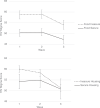Does resource insecurity drive HIV-related stigma? Associations between food and housing insecurity with HIV-related stigma in cohort of women living with HIV in Canada
- PMID: 35818863
- PMCID: PMC9274209
- DOI: 10.1002/jia2.25913
Does resource insecurity drive HIV-related stigma? Associations between food and housing insecurity with HIV-related stigma in cohort of women living with HIV in Canada
Abstract
Introduction: Women living with HIV across global contexts are disproportionately impacted by food insecurity and housing insecurity. Food and housing insecurity are resource insecurities associated with poorer health outcomes among people living with HIV. Poverty, a deeply stigmatized phenomenon, is a contributing factor towards food and housing insecurity. HIV-related stigma-the devaluation, mistreatment and constrained access to power and opportunities experienced by people living with HIV-intersects with structural inequities. Few studies, however, have examined food and housing insecurity as drivers of HIV-related stigma. This study aimed to estimate the associations between food and housing insecurity with HIV-related stigma among women living with HIV in Canada.
Methods: This prospective cohort study of women living with HIV (≥16 years old) in three provinces in Canada involved three waves of surveys collected at 18-month intervals between 2013 and 2018. To understand associations between food and housing security and HIV-related stigma, we conducted linear mixed effects regression models. We adjusted for socio-demographic characteristics associated with HIV-related stigma.
Results and discussion: Among participants (n = 1422), more than one-third (n = 509; 36%) reported baseline food insecurity and approximately one-tenth (n = 152, 11%) housing insecurity. Mean HIV-related stigma scores were consistent across waves 1 (mean [M] = 57.2, standard deviation [SD] = 20.0, N = 1401) and 2 (M = 57.4, SD = 19.0, N = 1227) but lower at wave 3 (M = 52.8, SD = 18.7, N = 918). On average, across time, food insecure participants reported HIV-related stigma scores that were 8.6 points higher (95% confidence interval [CI]: 6.4, 10.8) compared with food secure individuals. Similarly, participants reporting insecure housing at wave 1 tended to experience greater HIV-related stigma (6.2 points, 95% CI: 2.7, 9.6) over time compared to stably housed participants. There was an interaction between time and housing insecurity, whereby baseline housing insecurity was no longer associated with higher HIV-related stigma at the third wave.
Conclusions: Among women living with HIV in Canada, experiencing food and housing insecurity was associated with consistently higher levels of HIV-related stigma. In addition to the urgent need to tackle food and housing insecurity among people living with HIV to optimize wellbeing, getting to the heart of HIV-related stigma requires identifying and dismantling resource insecurity-related stigma drivers.
Keywords: HIV stigma; food insecurity; housing insecurity; poverty; stigma; women living with HIV.
© 2022 The Authors. Journal of the International AIDS Society published by John Wiley & Sons Ltd on behalf of the International AIDS Society.
Figures
References
-
- Whittle HJ, Palar K, Seligman HK, Napoles T, Frongillo EA, Weiser SD. How food insecurity contributes to poor HIV health outcomes: qualitative evidence from the San Francisco Bay Area. Soc Sci Med. 2016;170:228–36. - PubMed
-
- Logie CH, Wang Y, Marcus N, Kaida A, O'Brien N, Nicholson V, et al. Factors associated with the separate and concurrent experiences of food and housing insecurity among women living with HIV in Canada. AIDS Behav. 2018;22(9):3100–10. - PubMed
Publication types
MeSH terms
LinkOut - more resources
Full Text Sources
Medical


